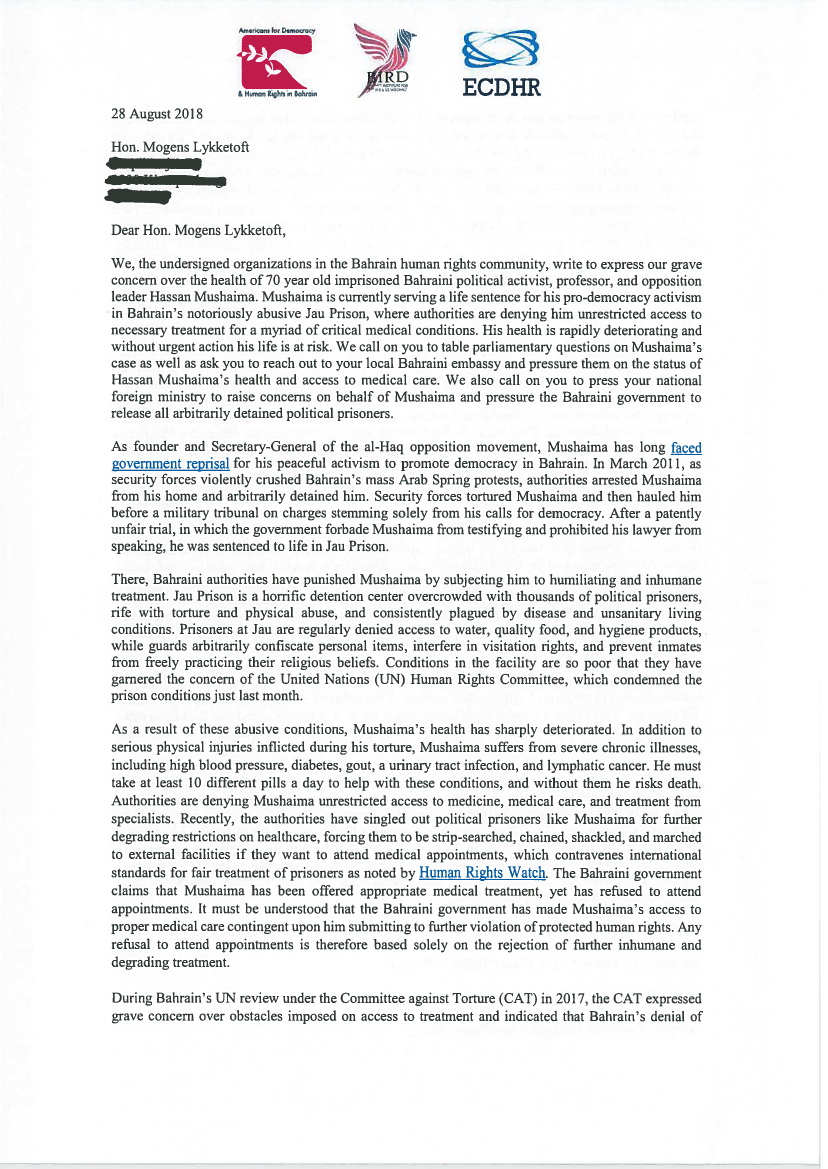
&RIIBoh,n
28 August 2018
Hon. Mogens Lykketoft
ECDHR
ii
-sir--.
—i—. J
1
1--
Dear Ron. Mogens Lykketoft,
We, the undersigned organizations in the Bahrain human rights community, write to express our grave
concern over the health of 70 year old imprisoned Bahraini political activist, professor, and opposition
leader Hassan Mushaima. Mushaima is currently serving a life sentence for his pro-democracy activism
in Bahrain’s notoriously abusive Jau Prison, where authorities are denying him unrestricted access to
necessary treatment for a myriad of critical medical conditions. His health is rapidly deteriorating and
without urgent action hs life is at risk. We call on you to table parliamentary questions on Mushaima’s
case as well as ask you to reach out to your local Bahraini embassy and pressure them on the status of
Hassan Mushaima’s health and access to medical care. We also call on you to press your national
foreign ministry to raise concems on behalf of Mushaima and pressure the Bahraini government to
release all arbitrarily detained political prisoners.
As founder and Secretary-General of the al-Raq opposition movement, Mushaima has long
government reprisal for his peaceful activism to promote democracy in Bahrain. In March 2011, as
security forces violently crushed Rahrain’s mass Arab Spring protests, authorities arrested Mushairna
from his horne and arbitranly detained lim. Security forces tortured Mushaima and then hauled him
before a military tribunal on charges stemming solely from his calls for dernocracy. After a patently
unfair trial, in which the government forbade Mushaima from testifying and prohibited his lawyer
from
speaking, he was sentenced to life in Jau Prison.
There, Bahraini authorities have punished Mushaima by subjecting him to hurniliating and inhurnane
treatment. Jau Prison is a horrific detention center overcrowded with thousands of political prisoners,
rife with toraire and physical abuse, and consistently plagued by disease and unsanitary living
conditions. Prisoners at Jau are regularly denied access to water, quality food, and hygiene products,
while guards arbitrarily confiscate personal items, interfere in visitation rights, and prevent inmates
from freely practicing their religious beliefs. Conditions in the facility are so poor that they have
garnered the concern of the United Nations (UN) Human Rights Committee, which condemned the
prison conditions just last month.
As a result of these abusive conditions, Mushairna’s health has sharply deteriorated. In addition to
serious physical injuries inflicted during his torture, Mushaima suffers from severe chronic ilinesses,
including high blood pressure, diabetes, gout, a urinaiy tract infection, and lymphatic cancer. He must
take at least 10 different puls a day to help with these conditions, and without them he nsks death.
Authorities are denying Mushaima unrestricted access to medicine, medical caTe, and treatment from
specialists. Recently, the authonties have singled out political prisoners like Mushaima for further
degrading restrictions on healthcare, forcing them to be strip-searched, chained, shackled, and marched
to extemal facilities if they want to attend medical appointments, which contravenes international
standards for fair treatment of prisoners as noted by Human
Rights
Watch. The Bahraini government
claims that Mushairna has been offered appropriate medical treatment, yet has refused to attend
appointrnents. It must be understood that the Bahraini government has made Mushaima’s access to
proper medical care contingent upon him submitting to fiirther violation ofprotected human rights.
Any
refusal to attend appointments is therefore based solely on the rejection of fiirther inhumane and
degrading treatment.
During Bahrain’s UN review under the Committee against Torture (CAT) in 2017, the CAT expressed
grave concern over obstacles imposed on access to treatment and indicated that Bahrain’s denial of